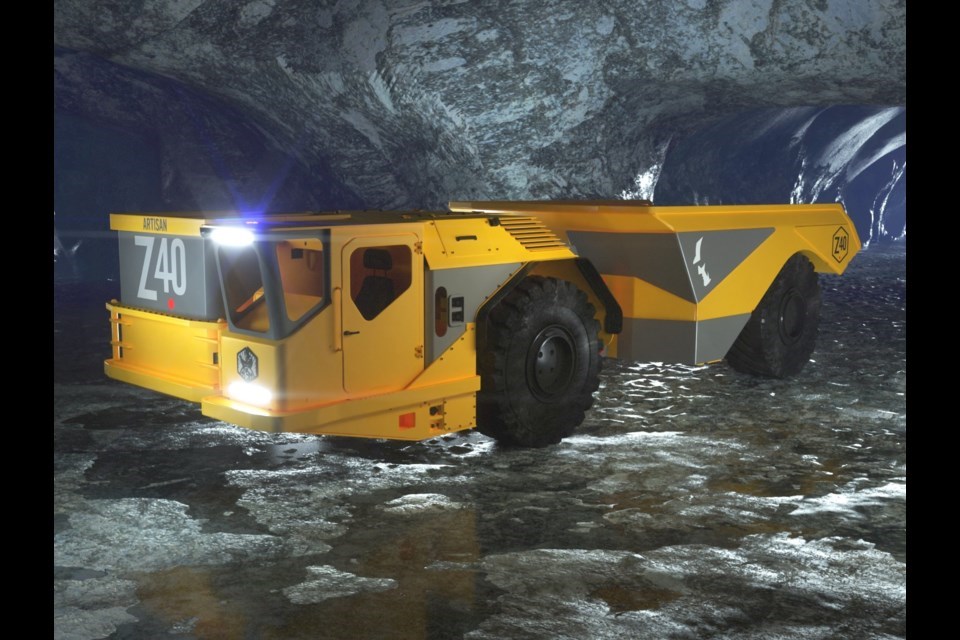Mike Mayhew, a leading consultant on the role of Battery Electric Vehicles (BEVs) in mining, says education and training are the next key steps to the evolution of implementing BEVs in global mining operations.
Mayhew was one of the key speakers at the Maintenance, Engineering and Mine Operators Conference in Sudbury, where part of the focus was discussing the role of BEVs in the Canadian mining industry.
The event was hosted by the Sudbury branch of CIM (Canadian Institute of Mining, Metallurgy and Petroleum) and was held at Science North.
Mayhew, the founder of Mayhew Performance, said while battery-powered mining vehicles are no doubt the way of the future, it is not simply a matter of selling off old diesel-powered mining equipment and buying all new BEVs. He said part of his role is to help mining companies decide on how to put new BEV mining operations into reality.
Mayhew said there are many obvious economic and safety benefits to having battery-powered vehicles, but the overall mine design and infrastructure has to be considered before bringing in new trucks, new loaders, huge batteries and charging equipment.
"Among items that you should be thinking about is whether the mining method is the right one in the design. Look at your power and infrastructure, ensure you've got the power to charge your total fleet," Mayhew said.
"You know your ventilation design and criteria are extremely important. We want to know how you will get air. Some people will say you don't need air because it will be BEV. Well, you still need air at the face and for blasting, so that doesn't change. It's just a reduction in air," Mayhew added.
He outlined his personal experience of having introduced the first battery-powered truck underground at the Kirkland Lake Gold Macassa Mine, where Mayhew was the superintendent a few years back. The vehicle was disassembled and hoisted down the shaft. It was reassembled and put to work right away.
Mayhew said within his first 24 hours on the job, the truck had an unexpected breakdown and held up production for several hours before anyone could get the battery truck repaired.
"So my story or my lesson learned here is that these things happen. So get ready," Mayhew told the audience.
He added that maintenance on BEVs requires a new way of thinking. It requires having qualified technicians, electricians, millwrights and mechanics who know how to respond when things go wrong.
Mayhew said he was glad to see that both Collège Boréal and Cambrian College in Sudbury are offering training programs for the maintenance of battery-powered vehicles in mining and for the training of technicians related to BEVs in mining.
"You have to be able to understand you're dealing with high voltage now. So it's a different way of thinking; different components; having the proper certified PPE equipment, you know, to deal with high voltage. What are the procedures, the lockout, and of course number one, you know, making sure that you understand what you're dealing with when it comes to high voltage,” he said.
Mayhew added there is a complete list of specific needs to be considered in terms of having the properly certified tools, having spare parts on site and a proper underground facility for battery and vehicle maintenance.
Mayhew said that setting up a new BEV operation also requires advanced training not just for maintenance people but also for the vehicle operators.
Mayhew added that one of his favourite comments to those planning for BEV mining operations is that the easy part is buying the new equipment.
"The next phase is going to be extremely difficult for success. And when I talk about operational readiness and risk mitigation, and when I talk about that, this is going to be the most critical part of the job," he said.
Mayhew recalled that when designing his first battery-powered haulage truck, he didn't have a true understanding of how much work it would take to get the truck into production, keeping it maintained and operating successfully.
He said that BEVs present new risks and challenges, but the important thing is that the people who use and service the equipment need to be trained for it.
He said BEVs are the way of the future in mining, not just in Northern Ontario, but across Canada, throughout North America, Central America and Europe. Mayhew said his final message is to plan ahead, do the right training and preparation and not to forget about safety at any step along the way.
"And lastly, make sure that people are safe, because we're dealing with high voltage up to 600 volts. So if anybody knows anything about power, it can hurt you, and it can kill you," he said.
Len Gillis covers mining and health care for Sudbury.com.
